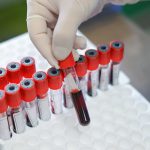-
Forward Look
The Overlooked Issue of Hearing LossStudy underscores importance of regular hearing tests for those who receive cisplatin chemotherapy.
by Risa Kerslake
-
Policy Matters
Toward Improved Dosing in the Precision Oncology EraA forthcoming article series outlines considerations for the dose optimization of modern oncology drugs.
by Brad Davidson, PhD
-
Overcoming Resistance
People with metastatic hormone receptor-positive breast cancer are living longer, thanks to new targeted therapies and endocrine therapies that can be prescribed when treatment resistance develops.
by Kendall K. Morgan
-
Liquid Biopsies: A Fast, Accurate Alternative
Blood tests can guide treatment choices, delivering results in less time than traditional biopsies.
by Stephen Ornes
-
Rural Cancer Care
Rural residents with cancer tend to have later diagnoses and poorer outcomes. Researchers and oncologists are working to identify and remove the barriers they face.
by Mark Ray
-
Facts and Stats
A Broader View of ResearchPeople diagnosed with cancer can participate in various kinds of studies.
by Thomas Celona
-
Treating HER2-ultralow Breast Cancer
FDA approval expands treatment options for people with metastatic breast cancer that expresses minimal levels of HER2.
by Sandra Gordon
-
Screening Options for People With Dense Breasts
Reports on breast density inform women of their status but raise questions about what to do next.
by Robin Roenker
-
Injection Immunotherapies Get FDA Approval
Giving immunotherapy drugs as injections, rather than intravenously, means patients can spend less time in the hospital or treatment center.
by Laura Gesualdi-Gilmore
-
Treating Smoldering Multiple Myeloma
A monoclonal antibody drug reduced the risk of smoldering myeloma progressing to multiple myeloma in patients at high risk for disease progression.
by Sandra Gordon
Cancer Talk
At-home Prostate Cancer Test May Help Some Men Avoid Biopsy
The test, which analyzes urine for 18 cancer-specific genes, ruled out the need for biopsy in men with elevated PSA without a digital rectal exam.
by Sandra Gordon
The Power of ComedyIn a new play, the pain of cancer can be a chance to laugh.
by Ashley P. Taylor
Melanoma Risk in Childhood Cancer SurvivorsPeople treated for childhood cancer found to have twice the risk of developing melanoma as an adult.
by Cameron Walker
Online Second OpinionsMore than half of patients who participated in a program offering online second opinions were recommended a change to their treatment plan.
by Eric Fitzsimmons















